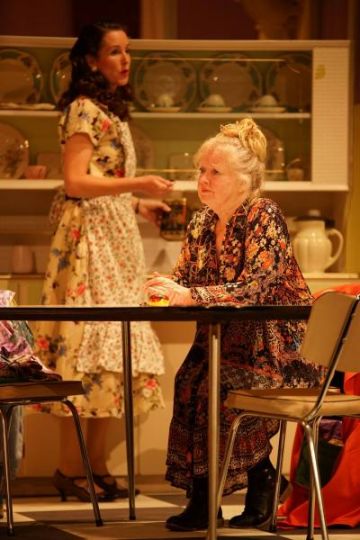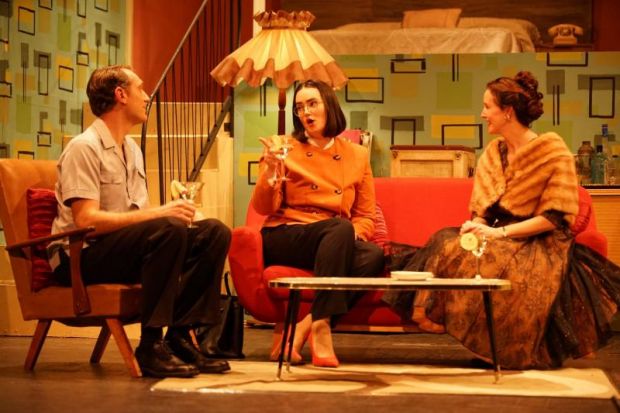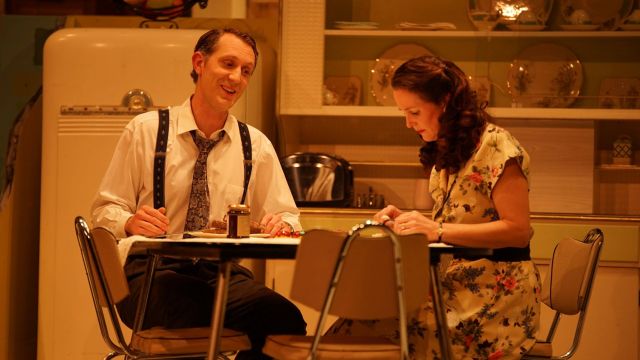Home, I’m Darling
Judy and Johnny love the 1950s lifestyle. They love the clothes, their house is decorated with the best furniture and appliances, and when Johnny comes home from work each night, Judy is there waiting with his slippers and a cocktail.
The problem they face is that they live in the twenty-first century: he must have a mobile phone for work, she needs a laptop to find their vintage furnishings online. Despite a decent payout from her redundancy three years earlier, the expensive lifestyle has taken a toll on their finances, and Johnny desperately needs a promotion for them to continue living ‘the dream’.

It’s Judy’s fantasy, and Alicia Zorkovic dominates as the once-high-flying executive, choosing to exchange her long hours in the office for the life of a 1950s housewife. Zorkovic is more convincing when Judy is less so. Stephen Bills plays her husband, Johnny, and he switches personas well, flicking between fully embracing the lifestyle and whingeing about its limitations – even for him, as a man.
The actors are almost upstaged by the phenomenal set, designed by Gary Anderson, and brilliantly constructed by Don Oswald’s team at Therry. The kitchen is sumptuous, filled with crockery and period appliances – the refrigerator, familiar to many in the audience, acts almost as a centrepiece. The authenticity extends to the costumes: Gillian Cordell and Sandy Faithfull have assembled a fantastic collection of dresses, suits, and cardigans that help to root this production in the positive stylings of post-war England.
Of course, beneath the superficiality of gin cocktails and devilled eggs, it’s not all great. Laura Wade’s light comedy takes a while to reveal all of the dark edges that roughen up the English modern play, and it’s primarily through the words from Judy’s mum, Sylvia (Deborah Walsh), and the actions of their friend Marcus (Adam Schultz). Sylvia rips into Judy’s nostalgia, reminding her that unless you were white, straight, and male, there wasn’t much to be happy about – Walsh has some of the best lines, and is excellent countering Judy’s idealism. This is reinforced when Marcus attempts to explain away his inappropriate behaviour with a female colleague. Schultz’s shedding of his ‘nice guy’ exterior is done well. Jessica Corrie is decent as Fran, Judy’s friend and Marcus’ wife, and Lani Gerbi brings considerable interest to Alex, Johnny’s new boss – she offers realism into moments that remind us we’ve come a long way into the present day.

That’s the challenge with these themes in Laura Wade’s writing: showing us the two sides of nostalgia, where the ‘good old days’ had more awful ones. Director Jude Hines embraces both, her love for that period clear through the production’s visual style and choice of inter-scene music, and her passion to show what was wrong with that period just as strong. The first act takes a while to set the scene, though it comes alive after the interval – the momentum building well when we begin to see the full picture, though it’s not always sustained through scene changes that can run a little too long.

It's a beautiful examination of the benefits and pitfalls of nostalgia, with the pervasive attitudes that should have remained back there. It shows us the still-growing need for equality between the sexes, and whilst this production has a strong desire to remind us of how much has changed in seventy years, it’s not afraid to point out that there’s still a long way to go.
Mark Wickett
Subscribe to our E-Newsletter, buy our latest print edition or find a Performing Arts book at Book Nook.

